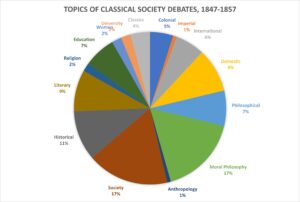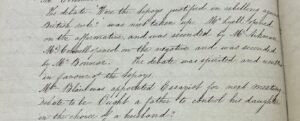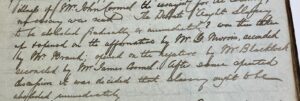Student attitudes to slavery and empire in the mid-19th century, by Rachel Hart
What did the students at St Andrews in the nineteenth century think about slavery, colonialism and empire? Unless they wrote or spoke publicly about it, it’s difficult to say… The archives of the University tend to be focused on institutional business, and on the activities of the academic staff and senior officers. However, the University library also holds archival material produced by the students themselves while at university – student magazines or newspapers, diaries and occasional letters. Here, we explore the surviving records of student debating societies, to see what the topics chosen for debate, and the outcomes of those debates, might tell us about student attitudes to colonialism.
In mid-nineteenth century St Andrews, debates were regularly held by both the Literary Society (founded in 1794) and the Classical Society (founded sometime before 1846). In 1890, these societies would merge to form the current Union Debating Society. The normal pattern for their weekly meetings was to discuss society business, followed by the reading of an essay from a previously nominated member, followed by a debate.
The surviving minute books for these societies start in 1831 and 1846 respectively. From them, we can see both the list of topics proposed for debate, and the records of debates that actually took place. At the Classical Society, less than half of the topics suggested at the start of the academic year would actually be selected for discussion. Nonetheless, the list of topics that were suggested tells us something about the sorts of issues that students were interested or concerned about. For instance, between 1847/48 and 1856/57, over a thousand topics for possible debate were suggested by members of the Classical Society (see Figure 1). Despite the name of the society, the relative merits of Greek and Roman drama or poetry were rarely debated. Literary and historical topics were more common, ranging from the Crusades, Napoleon, and the murder of Mary Queen of Scots to comparisons between the writings of Burns and Scott.
The largest proportion of topics were of a broadly moral philosophical nature: “Is ambition a vice?” (suggested in 1847, 1848, 1849); “What exalts a man more in the eye of the world, a good head or a good heart?” (1850, 1858); and favourites “Is an advocate justified in defending a man whom he knows to be guilty?” (9 times) and on happiness (12 times). One of the most frequent actual debates was on the abolition of capital punishment, but the abolition of excise laws, university tests, game laws, poor law, academic costume and taxes on books featured on the list.

Many topics proposed for debate were about current affairs, both international and domestic, and this is where we see some hints that St Andrews students were aware of what was going on outside north east Fife. About 6% of the topics proposed to the Classical Society in the 1847-57 sample could be said to relate to colonial activity, broadly understood. Through the rest of the nineteenth century, the lists typically contain one or two topics each year interrogating British interventions in India, north America, Australia and New Zealand. For instance, in 1862/63, the list of suggested topics (Figure 2) included: “Was the conquest of India a justifiable act?”; “Has the British policy in New Zealand been just towards the natives and creditable towards the colonists?”; and “Is Ireland a country more sinned against than sinning?”

Britain’s role in India had been suggested as a possible topic for the Literary Society back in 1847/48, but had not been selected for debate. In 1863, the Classical Society did debate it, and voted 18 to 13 that Britain had been justified in taking possession of India. They had nonetheless shown some willingness to criticise the British government’s handling of the Indian Rebellion of 1857, having previously debated, “Can any blame be attached to the British government for its conduct in the Indian war?” (yes; December 1857) and “Were the Sepoys justified in rebelling against British rule?” (yes, after a ‘spirited’ debate, see Figure X; February 1860)

The question of how settler colonies should be governed arose on several occasions. As well as the question about New Zealand suggested in 1862, the Classical Society had previously debated “Ought we to leave Canada and Cape Colony to shift for themselves?” (no, February 1850) and the following year, “Will the Australian colonies one day secede from the mother country as the United States formerly did?” (yes; February 1851).
Debates occasionally addressed colonization as a concept, rather than its practice in a specific region. For instance, in 1845/46, the question “Is colonization advantageous or prejudicial to the mother country?” was suggested to the Literary Society (but not selected for debate). Twenty years later, the Classical Society did debate “Whether distant and extensive colonies are a source of weakness or of strength to the mother country?” (a source of strength, April 1864).
Some of the topics proposed for discussion in the middle of the nineteenth century are phrased in language that would be offensive today. For instance, in 1848/49, the Classical Society decided not to debate “Does the seizing of the lands of a barbarous nation by civilised men tend to a good end?”, but the following academic session, they did debate, “Can a savage nation emerge unassisted from barbarism?” (no, April 1850). In 1858, the University of St Andrews awarded a medical degree to a West African candidate of Yoruba ancestry, William Broughton Davies – but we have no way of telling whether that had any effect on either the suggestion of a debate in 1858/59 on “Is the intellect of the black man inferior to that of the white?”, or on the decision not to debate it. The suggestion could equally have been inspired by events in the United States, or by readings in contemporary anthropology.
The very first item on the list of proposed topics in 1862/63 was “Ought slavery to be abolished gradually or immediately?” Since slavery had already been abolished in the British empire, this debate was about the United States, and was stimulated by the outbreak of the Civil War. It had in fact already been debated by the members of the Classical Society in January 1861, but that did not stop them repeating the debate the following year. The phrasing of the motion makes clear that the students were sure slavery should be abolished, and that the only question was the timing and process. The record of the debate in 1861 (Figure 4) includes the names of the speakers on both sides of the debate and the final outcome but reveals disappointingly little about the actual content of the arguments advanced on either side, though there was, apparently, ‘some spirited discussion’. In 1861, the supporters of immediate abolition won the debate, but in 1862, the proponents of gradual abolition won. The Classical Society also considered debating “Is the cause of the Northern States of America the cause of human progress?” and “Has the time come for the intervention of the Great Powers in American affairs?” (in 1862/63).

The minute books of the debating societies reveal that St Andrews students had some awareness of debates about race, colonialism and imperial governance, but they also suggest that students were more concerned with domestic politics or, indeed, with historical and moral philosophical questions (and, in the 1880s, with whether women should be admitted to the University). The lack of surviving detail about the intellectual content of the debates means that we remain uncertain about the arguments that were put forward, or about the range of opinions expressed. It is not even clear whether the recorded result of a debate reflects a commonly-held opinion among the student body about that issue, or admiration of the skill of the debating team.
—
Rachel Hart is a Senior Tutor in the School of History at the University of St Andrews. Until 2023, she was Head of Special Collections at the University of St Andrews.
—
Sources:
Graham Stewart, The Union Debating Society 1794-1990: a history of debating at St Andrews University (Dundee, 1991)
University of St Andrews archives, records of the Literary Society and the Classical Society
